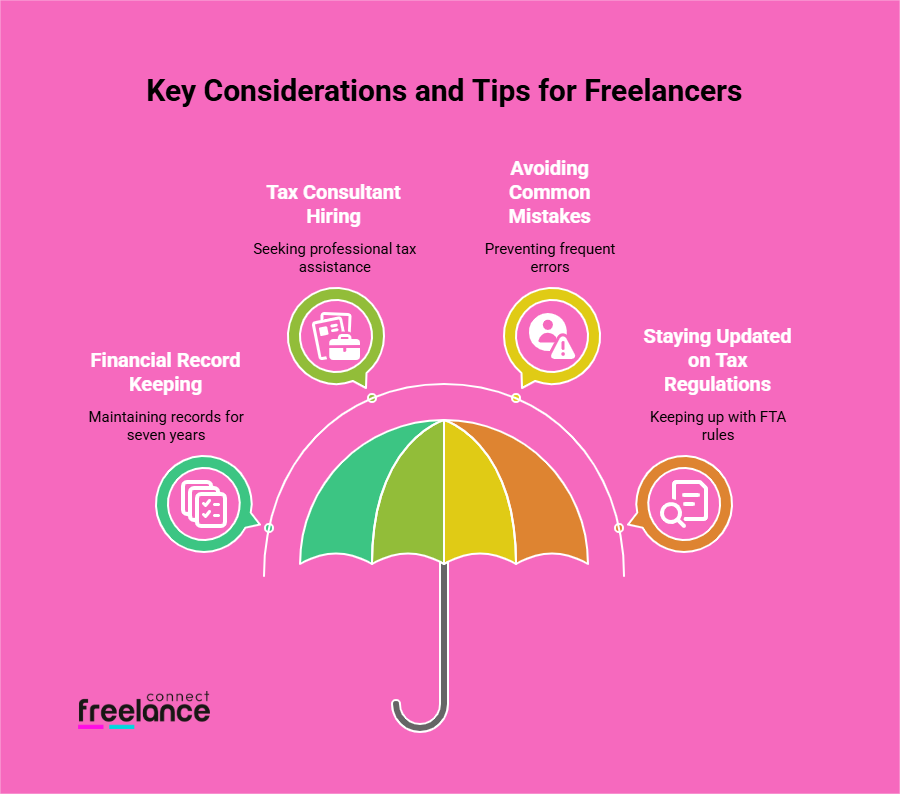The UAE implements a federal Corporate Tax (CT) system that applies to corporations and individuals who do business. Freelancers in the UAE should know about this significant alteration because it makes more businesses liable for taxes.
The UAE used to not have a personal income tax, but the new CT law now applies to those who conduct business. Freelancers must register for corporate tax if their annual business revenue is more than a million AED. If you make less than AED 375,000, you don’t have to pay any taxes. If you make more than that, you have to pay nine percent of the additional earnings.
It makes sure that the UAE meets international standards for tax transparency and gets revenue from more than just oil. Freelancers need to keep accurate financial records and file their UAE corporate tax every year to stay in compliance and avoid fines.
Understanding Corporate Tax in the UAE
The UAE’s Corporate Tax (CT) is a tax on the net revenue or profit of enterprises. Its goals are to increase government revenue, comply with global requirements for tax transparency, and stop detrimental tax practices.
Who has to pay CT? The CT applies to a lot of things, including:
Juridical individuals:
Companies that are based in the UAE mainland or free zones and branches of international organizations.
Professional individuals:
Freelancers and individuals who own businesses in the UAE.
Business types:
Freelancers:
The CT regulates them if their business operations bring in more than one million AED every year.
SMEs and mainland firms:
If your taxable income is less than three lacs seventy-five thousand AED, you don’t have to pay any taxes. If it’s more than that, you have to pay nine percent.
Enterprises in Free zones:
If they meet certain conditions, like having sufficient value and earnings from “approved activities,” they may be able to get a zero percent CT rate on “certain income.” Revenue that doesn’t qualify is taxed at nine percent.
Does Corporate Tax Apply to freelancers in the UAE?
Yes, freelancers in the UAE do have to pay corporate tax, but there are some conditions. The UAE’s Corporate Tax (CT) law will include individuals who execute business operations with a certain revenue per year.
Main points for freelancers:
Tax threshold:
If a freelancer makes more than one million AED per year from their business, they have to pay corporate tax in the UAE.
Corporate Tax Rate:
If the threshold meets the criteria, the tax measure is zero percent on earnings up to three lacs seventy-five thousand AED and nine percent on earnings over this amount.
Sign up:
Freelancers who make more than one million AED per year must sign up with the FTA and file tax returns every year.
Corporate Tax Exemptions:
People who work for a company, invest their funds, or buy property unless it’s part of an authorized business usually don’t have to pay corporate tax in the UAE on their earnings.
Freelancers need to keep accurate financial records to make sure they adhere to the rules and to figure out how much tax they owe.
Who qualifies as a freelancer under UAE laws?
According to UAE corporate tax legislation, a freelancer is an individual who runs a “business or business operation.” It encompasses contract workers, self-employed experts, consultants, and content creators.
Corporate tax threshold for freelancers
If a freelancer in the UAE makes more than one million annually from their business, they have to pay corporate tax in the UAE. The limit set is based on gross revenue instead of net income. If they proceed over this limit, they have to sign up for CT, which has a zero percent tax rate on taxable earnings up to 375,000 Dirhams and a nine percent tax rate on earnings above that.
Taxable income for freelancers: exceptions and exemptions
For freelancers in the UAE, “taxable income” mostly implies all the revenue that they make from their business or business operations if their annual turnover is more than one million Dirhams. It includes:
Charges for services:
Settlements for specialized services like consulting, architecture, writing, programming, or anything else.
Selling products:
Earnings from selling goods, whether digital, such as e-books and online courses, or physical items.
Sales commissions and royalties:
Earnings through affiliate marketing, related to intellectual property rights, or referral schemes.
The Benefits of non-cash revenue:
Non-cash rewards or perks that have a monetary value, like sponsored trips, free goods, or exchanged services. These must be valued at their equitable market price.
Exemptions and exceptions:
Income from Work:
Individuals do not have to pay corporate tax in the UAE on their salaries and other earnings from traditional jobs.
Personal investing:
Generally, revenue you make from personal investments, like bank interest, dividends, or capital gains from stocks and bonds you own personally, is not taxable.
Investments in property:
Rental earnings from homes or capital gains from selling your property are usually not included, unless those operations are part of an authorized business.
Support for small businesses:
Freelancers who make less than three million AED annually can choose “Small Business Support,” which means they won’t have to pay taxes on their earnings.
UAE Corporate Tax Rate Explained

The UAE’s corporate tax system has different tax rates for different levels of income. The common corporate tax rate is nine percent, but it only applies to taxable earnings that exceed a certain amount.
The UAE corporate tax costs are as follows for companies and freelancers:
• zero percent on taxable earnings up to 375,000 Dirhams.
• nine percent on taxable earnings over 375,000 Dirhams.
This progressive structure is meant to help medium-sized companies and freelancers with lower incomes, while larger companies and individuals with higher incomes pay more in taxes.
It’s important to remember that some major international companies may have to pay a higher rate up to fifteen percent under the Domestic Minimum Top-Up Tax to match the Two international minimum tax framework.
Small business relief
Small Business Relief is available in the UAE for qualified resident taxable individuals, including freelancers. If a business makes three million Dirhams or less in sales in a tax year and all previous years, it can choose to have no taxable profits for that year. It makes it easier for small companies to comply with the rules and get rid of their UAE corporate tax responsibility.
VAT vs. Corporate Tax – clarifying the difference
Value Added Tax (VAT) in UAE:
It is a five percent indirect tax on products and services at every step of the supply chain, which the end consumer subsequently pays. Firms collect it and send it to the government.
Corporate Tax (CT) in UAE:
It is a tax that companies have to pay on their net profits. The business itself pays it, and the rates are zero percent for taxable revenue up to 375,000 Dirhams and nine percent for earnings above that. VAT applies to sales, while CT applies to the business’s overall profit.
Example scenarios for freelancers
1. A graphic designer who works for themselves makes one million AED every year. They need to sign up for CT and pay zero percent on the initial income and nine percent on the last revenue.
2. A social media influencer makes 800,000 Dirhams annually. They don’t have to pay UAE corporate tax right now because their income is less than one million AED.
How freelancers can register for corporate tax in the UAE
Freelancers in the UAE who make more than one million AED a year must sign up for Corporate Tax. The Federal Tax Authority’s online portal is where most of the work happens:
Sign in to the FTA Account Online:
Go to the FTA tax portal. Sign up if you don’t already have an account, like if you registered for VAT. If not, use your current login information or UAE Pass.
Taxable individual:
Add your information as a new taxable individual if your profile doesn’t already have one.
Registering for corporate Tax:
Go to the UAE corporate tax part and click on registration. Read the rules and agree to them.
Information about the entity:
Select Individual as the type of entity and fill in the spaces with information such as the trade license number, the legal form of business, and the UAE corporate tax registration number.
Identification and business operations:
Enter your business’s legal name, and a complete list of all the business tasks you do under your license.
Permitted signatory:
Give the name and contact information of the authorized signatory, who is usually the freelancer. It involves your Emirates identification or passport.
Review and send:
Check that all of the details you entered are correct, check the box for the declaration, and then send in your application.
The FTA will give you a UAE corporate tax registration Number (TRN) once it approves your application. If additional details are needed, the process could take as many as twenty business days or longer.
Documents required for CT registration
As a freelancer in the UAE, you will usually need the following documents to register for corporate tax:
- A valid business license or freelance permit.
- Passport or Emirates ID of the person who is signing up.
- Proof of income and financial records.
How to get in touch:
A working email address and mobile number. For an easy UAE corporate tax registration process, it is very important to keep your paperwork accurate and updated.
Tax return filing and compliance obligations
Freelancers who register for UAE Corporate Tax have to meet a number of compliance requirements. The main thing you need to do is file an annual Corporate Tax return through an online FTA portal. It needs to be completed within nine months of the end of their fiscal year.
They also need to keep accurate invoices, receipts, and bank statements for the last few years. These will be important for figuring out taxable earnings and backing up their tax return for an audit. If you don’t register on time or file the tax returns before the due date, you could face large fines. Even if a freelancer is eligible for Small Business Relief and doesn’t owe any taxes, they still usually have to file a return.
Key considerations and tips for freelancers
Keep proper financial records for seven years. Make a clear distinction between business and personal costs. Keep up with the latest FTA rules and any changes that might happen to them to avoid fines. Consider getting professional tax assistance.
Keeping financial records
Keep all of your financial records, like invoices, receipts, and bank statements, after the conclusion of the tax year in question. To make sure your taxable revenue is correct, make sure you separate your company and personal expenses.
Hiring tax consultants or advisors
It can be hard to figure out how to deal with new tax laws. Freelancers in the UAE can get great advice from a trained tax expert or advisor. It helps them stay compliant, get the best tax positions, and avoid fines. They can assist you in registering, keeping records, and filing.
Common mistakes to avoid
Freelancers need to stay away from frequent mistakes, like absent registration or filing due dates, as late UAE corporate tax registration costs ten thousand AED. Don’t combine your personal and company funds; maintain them in separate bank accounts. To prevent getting your deductions refused and paying fines, keep proper documentation.
Staying updated on tax regulations
Check the Federal Tax Authority’s official website often for new information. To stay up to date on updated regulations, clarifications, and deadlines, sign up for tax advising emails and go to webinars.
Conclusion
The new corporate tax in the UAE is an enormous shift for freelancers. To keep doing well, you need to understand this new system. The UAE is still an ideal location to work for freelancers. However, freelancers who make more than one million AED a year must now register and pay an additional 9 percent tax on earnings over 375,000 Dirhams.
In the UAE’s fast-paced business world, compliance is key to avoiding fines and encouraging long-term growth. It means keeping precise records and filing on time. It is very important to get professional tax guidance if the case is complicated or you want to make sure you adhere to all the rules. Freelancers will be able to thrive in the changing tax environment if they actively engage with these newly introduced regulations.
Author
-
Experienced and detail-oriented freelance administrative professional with a proven track record of efficiently managing administrative tasks across various industries. Possesses excellent organizational skills, a keen eye for detail, and a strong commitment to delivering high-quality work. Skilled in providing comprehensive administrative support to individuals and businesses, ensuring smooth operations and increased productivity.
View all posts






